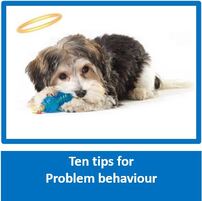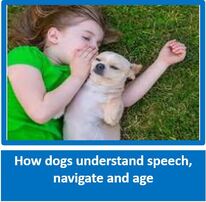
Please visit and LIKE / FOLLOW our Facebook Page and share with family, friends and on your own Facebook page, and ask them to share further – it is only by working together and sharing knowledge and education that we can improve the lives of dogs and assist owners. We do not inundate you with posts – an average of 5 per week, plus one Tip of the Week, and the odd informative post. Thank You!
Loud voices makes dog urinate......Ask a Trainer
By Nan Arthur, CDBC, CPDT, KPACTP - www.wholedogtraining.com
Dear Trainer,
We have a two-year-old Dachshund that we adopted from a Rescue when he was 9 weeks old. He is a very sweet dog, but he pees whenever my husband approaches him or if he hears loud voices. We read that this would go away when he got older, but it’s still a problem, and I don’t mind if he does it on the floor, but he does it on furniture as well and that we can’t accept. Both my husband and I have tried everything; including clapping our hands, telling him, “No,” in a loud voice and picking him up and putting him outside when he does this, but none of these things have work. Do you have any suggestions? By the way, we did take him to the vet to have his urine checked in case it was a medical problem, but everything was fine on that end.
Signed,
Doxie Drenched
We have a two-year-old Dachshund that we adopted from a Rescue when he was 9 weeks old. He is a very sweet dog, but he pees whenever my husband approaches him or if he hears loud voices. We read that this would go away when he got older, but it’s still a problem, and I don’t mind if he does it on the floor, but he does it on furniture as well and that we can’t accept. Both my husband and I have tried everything; including clapping our hands, telling him, “No,” in a loud voice and picking him up and putting him outside when he does this, but none of these things have work. Do you have any suggestions? By the way, we did take him to the vet to have his urine checked in case it was a medical problem, but everything was fine on that end.
Signed,
Doxie Drenched

Dear Drenched,
I’m glad to hear you rescued your dog, and that you have had a through medical check up on him. That is very important to have done before trying to modify any behavior issue. If there is an underlying medical issue that has created or adds to the behavior issue, training and behavior modification will be more difficult, if not impossible.
From what you describe, you have a couple of things that might have happened to convince your dog that he needs to send this very clear message of fear. First, it seems as though your dog has developed a fear of loud voices, and may have associated it with your husband. These two things can become connected as men tend to have deeper voices, stand more frontally and more ridged in general, and since your dog has been reprimanded and startled for the urination problem, he may have associated that directly with your husband, and in general with loud voices.
The use of a loud, “No," can be very frightening (or at least offensive) to many dogs, and especially one that is using a submissive behavior to express his fear. Consider the following: If your dog is urinating when your husband approaches, it is most likely your dog's way of "telling" him he is scared. This response is actually a fear display that is a carry over from puppyhood, and is a puppy response to fear or conflict when they don’t know what else to do. “I submit,” is the message they are sending.
What happens, as in your dog’s case, is that his fear starts the submissive urination behavior to tell your husband that he is worried about what he is doing. Then, when the correction of, yelling “No,” is the response to his submissive urination, (even if it only happened one time) your dog will then feel a stronger need to "really" tell your husband that he is worried since the initial urination didn't get the message across, and as such, he will urinate more.
Understanding that your dog is actually trying to communicate with you is very important if you wish to help him get over this problem. With that in mind, it is important that you
don't scold your dog for the submissive urination and, instead, you and your husband should take a different approach to this problem.
What to work on
The first thing you will need is to build trust between your husband and your dog. You can do this via classical conditioning, which means pairing good things with your husband.
You will want to start with enough distance between your husband and the dog where your dog isn’t going to urinate if your husband walks in the room. As soon as your husband walks into the area where the dog is, begin giving your dog several really good food rewards such as tiny pieces of chicken, just for looking at your husband as he enters, and then stop feeding as soon as he leaves. Do that a number of times until you can see that your dog is anticipating the reward when your husband walks in. Your dog will be learning that when your husband is around, wonderful things happen, but when he leaves it all goes away.
After 10-20 sessions at this level, have your husband move a little closer to your dog and give your dog several high-value rewards again. Ask your husband to avoid making direct eye contact with your dog so your dog doesn’t feel any pressure to acknowledge your husband’s presence. Stay at this level a number of sessions, moving a tiny bit closer each round that you train. Strive to have your husband move close enough to your dog (without the urination, so go slow) that he is able to start handing your dog the food rewards himself. This might take a few weeks since this has been going on a long time, so be patience.
When your husband is able to get close enough to your dog to sit down near him, it should be without any pressure to interact with him. It will be important that your dog learns that your husband is not going to talk, lean over, pet or interact with him, just sit near and give him food rewards. This allows your dog the opportunity to initiate the interaction and with that, feel more confident that nothing bad is going to happen.
Be sure to take lots of little breaks in-between training so your dog can process all of this, however, if you see that your dog is concerned at any point, go back to an easier level and do that part until your dog has a stronger association.
I hope this helps with your problem, but if you are still having trouble after working on this, please contact a good positive reinforcement behavior trainer to help you work through all the steps and figure out what else your dog might need.
I’m glad to hear you rescued your dog, and that you have had a through medical check up on him. That is very important to have done before trying to modify any behavior issue. If there is an underlying medical issue that has created or adds to the behavior issue, training and behavior modification will be more difficult, if not impossible.
From what you describe, you have a couple of things that might have happened to convince your dog that he needs to send this very clear message of fear. First, it seems as though your dog has developed a fear of loud voices, and may have associated it with your husband. These two things can become connected as men tend to have deeper voices, stand more frontally and more ridged in general, and since your dog has been reprimanded and startled for the urination problem, he may have associated that directly with your husband, and in general with loud voices.
The use of a loud, “No," can be very frightening (or at least offensive) to many dogs, and especially one that is using a submissive behavior to express his fear. Consider the following: If your dog is urinating when your husband approaches, it is most likely your dog's way of "telling" him he is scared. This response is actually a fear display that is a carry over from puppyhood, and is a puppy response to fear or conflict when they don’t know what else to do. “I submit,” is the message they are sending.
What happens, as in your dog’s case, is that his fear starts the submissive urination behavior to tell your husband that he is worried about what he is doing. Then, when the correction of, yelling “No,” is the response to his submissive urination, (even if it only happened one time) your dog will then feel a stronger need to "really" tell your husband that he is worried since the initial urination didn't get the message across, and as such, he will urinate more.
Understanding that your dog is actually trying to communicate with you is very important if you wish to help him get over this problem. With that in mind, it is important that you
don't scold your dog for the submissive urination and, instead, you and your husband should take a different approach to this problem.
What to work on
The first thing you will need is to build trust between your husband and your dog. You can do this via classical conditioning, which means pairing good things with your husband.
You will want to start with enough distance between your husband and the dog where your dog isn’t going to urinate if your husband walks in the room. As soon as your husband walks into the area where the dog is, begin giving your dog several really good food rewards such as tiny pieces of chicken, just for looking at your husband as he enters, and then stop feeding as soon as he leaves. Do that a number of times until you can see that your dog is anticipating the reward when your husband walks in. Your dog will be learning that when your husband is around, wonderful things happen, but when he leaves it all goes away.
After 10-20 sessions at this level, have your husband move a little closer to your dog and give your dog several high-value rewards again. Ask your husband to avoid making direct eye contact with your dog so your dog doesn’t feel any pressure to acknowledge your husband’s presence. Stay at this level a number of sessions, moving a tiny bit closer each round that you train. Strive to have your husband move close enough to your dog (without the urination, so go slow) that he is able to start handing your dog the food rewards himself. This might take a few weeks since this has been going on a long time, so be patience.
When your husband is able to get close enough to your dog to sit down near him, it should be without any pressure to interact with him. It will be important that your dog learns that your husband is not going to talk, lean over, pet or interact with him, just sit near and give him food rewards. This allows your dog the opportunity to initiate the interaction and with that, feel more confident that nothing bad is going to happen.
Be sure to take lots of little breaks in-between training so your dog can process all of this, however, if you see that your dog is concerned at any point, go back to an easier level and do that part until your dog has a stronger association.
I hope this helps with your problem, but if you are still having trouble after working on this, please contact a good positive reinforcement behavior trainer to help you work through all the steps and figure out what else your dog might need.




